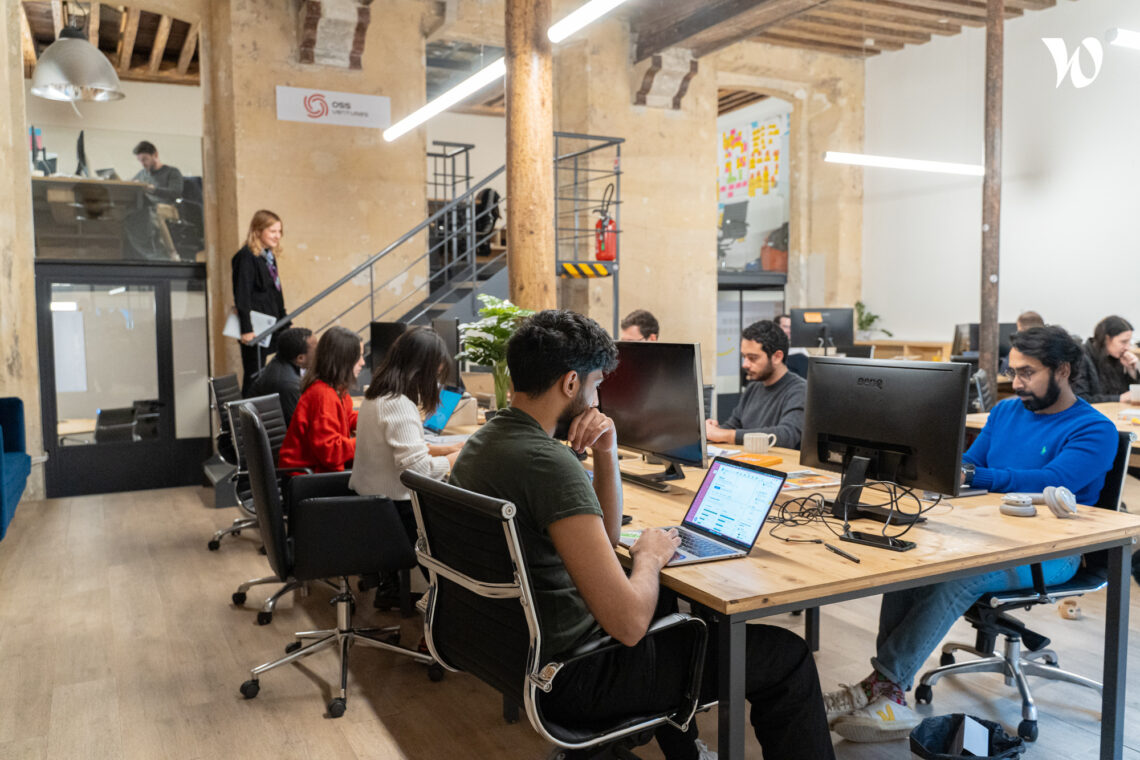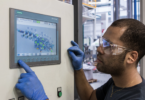Renan Devillieres learned about manufacturing and operational strategy while working as a senior partner at McKinsey and as a strategic project manager at Richemont, a Swiss holding company that produces everything from jewelry to firearms. He then switched to working in tech for five years, creating his own startup. His light bulb moment was when he realized that manufacturing operations employ 40% of the world’s workers and represent 25% of the world’s GDP yet only 0.7% of startups target the sector and the average tech worker knows nothing about manufacturing.
“It is a huge market, and it is hard to penetrate,” says Devilliers. Sensing an opportunity, he sold his tech company and created OSS Ventures, a Paris-based startup factory that fixes factories.
OSS’s structure is akin to a startup studio or venture builder and investment firm. The idea is to take people with deep sector knowledge and pair them with experienced founders. The French firm’s twist is that teams visit manufacturing plants and survey management and employees. If dozens of plants operated by different companies in different sectors have the same pain point OSS Ventures seeds a startup to solve that specific issue, typically investing €500,000 (€400,000 for salaries and €100,000 in cash) at the start. The insider knowledge makes a product fit – and customer sales – way more likely.
The strategy appears to be working. In just four years OSS has launched 15 startups with a total investment of €8 million in areas such as financial planning and analysis, supply chain and scheduling, shop floor management, data, industrial automation ,and sustainability. Four of the startups are working with LISI Group, a 247-year-old French company in the aerospace, automotive and medical sectors that operates 42 factories in 13 countries.
LISI is just one of the manufacturers that have opened their doors to OSS Ventures. The French startup studio says it has nurtured a unique network of 1700 manufacturing sites globally that are ready to test its technology and collaborate.
“We are not about being cool and we are not an accelerator,” says Devillieres. “We are an infrastructure that kills the bad reasons why good startups are not targeting manufacturing.”
Opening Factories
LISI-Group, a company that was launched before the French Revolution, had never worked with startups before encountering OSS Ventures, says Anne-Delphine Beaulieu, the company’s Chief Digital Officer and Chief Sustainability Officer. OSS approached the company in 2019 and asked whether LISI was willing to open its factories to startups ideas. “I thought why not, we always have the same eyes and the same people looking at problems so maybe we can learn something new,” she says, “But we had no real expectations at this early stage.”
After four months of sending teams to its factories OSS came to LISI’s management with the idea of digitizing production problem management. “It wasn’t on our top list of pain points,” says Beaulieu, “but their idea caught our interest.”
LISI agreed to test OSS’ minimum viable product (MVP) for free. After six months it needed to decide whether to move forward and at what price. “At that point we decided to become partners,” says Beaulieu. “In all we tested products from eight of their startups.”
LISI was the first adopter of products developed by at least three of OSS’ startups and within the first five adopters of technology from the last three or four,” she says. “In the beginning we left money out of the equation at the start of projects and played with them and let them play with our data and processes. They really refreshed a lot of things in our culture.”
In an interview with The Innovator Beaulieu outlined three of the ways that OSS has helped LISI advance its digital transformation and become more productive.
LISI’s first project with OSS Venture, which focused on production problem management software “paid back in every factory almost immediately,” says Beaulieu. Fabriq, the startup OSS created, aims to boost the efficiency in shop floor problem solving and also provides more autonomy to the production teams to handle their issues. All problems are created as tickets with tags, attached KPIs and a collaborative tool. “Before if there was a problem you would have to wait until a 10 o’clock meeting of supervisors and operators and list all the problems on a paper board,” says Beaulieu. “Now that the process is fully digital, everybody can get into a collaborative tool to create the ticket and propose a solution, with an action plan,” she says. “Operators, who used to be the providers of problems, can now provide their own solutions in 60% to 70% of the cases,” she says. The speed of solving problems has greatly increased and so has the autonomy of the people.”
Another project with OSS involves skills management on the shop floor. The problem for LISI was that the skills matrix was handled in Excel and updated only once or twice a year and was not useful for the daily task of adjusting the right team to the right production machines. “It was always a pain point whenever the planning changed or whenever employees would be absent,” says Beaulieu. “It would take time to readjust the production planning.” OSS launched a company called Mercateam to digitally manage, develop and transmit blue collar operator skills. “Now we have a complete mapping of all the skills on the site each day and if we have issues, the system helps us to identify the best skilled person available,” says Beaulieu. Mercateam also helps LISI identify gaps so it can upskill the necessary number of workers to ensure it has back-up. The project took eight months and payback time was a little over a year, she says.
OSS is also helping LISI with optimizing production planning through a startup called Oplit. The first factory that tested the new technology was using up to 50 Excel files to prepare the weekly production planning at factory level, autonomous production unit level and group autonomous production level. “If we had to adjust, we had to put people in a room with the Excel sheets,” she says. “Now the whole process is digital. The tool proposes the best way and if we need to adjust it, recommends the best options.” This case involved more integration interfaces, so it took longer than the other OSS solutions to deploy, says Beaulieu. LISI is pleased with the results and “the payback was there rather quickly,” she says.
Being an early customer has its advantages, says Beaulieu. “It really helped to be a partner in the development and not just the 100th customer,” she says. The partnership “is powerful,” she says. “We were able to attract our best people on those projects. We combined resources and were able to do more than we think we could have done on our own.”
LISI has now worked with a total of 12 startups, not all of them from OSS. It has been able to eliminate one to three days a week of the work of key people in all of the factories where new startup technology has been deployed, says Beaulieu. LISI did not make anyone redundant. “We use those days to optimize the use of data and to constantly engage in new efficiency gains” she says. LISI now has less people using Excel and more people analyzing data. “The dashboarding we have created with OSS’ startups is constantly improving our decision-making at every level,” she says. “We have done a lot of harmonization of useful key tags to use data more efficiently and are preparing to take data science to the next level and apply more AI to it.”
A Calibrated Startup Machine
Nestled in a former workshop of the French jeweler Van Cleef & Arpels in Paris’ 3rd district, a neighborhood once famed for its artisans, OSS’ Paris headquarters is home to the teams of 15 startups with nine different nationalities and different skill sets. Half are under the age of 26. A typical OSS startup has a team of 10 people, is about nine months old, has five to ten clients and an annual recurring revenue of €500,000. OSS owns 25% of the startups; the other 75% is owned by the two founders, a CEO and a CTO. Eight of the 15 companies have already raised follow-on funding from outside investors.
By testing products at a network of factories and establishing market fit OSS essentially “skips the steps that startups usually have to take when raising their first two funding rounds,” says Devillieres.
“Everything we do is based on a process,” says Devillieres. As a result OSS has been able to build unique, repeatable assets, he says. Each of the startups can leverage “reusable tech bricks”, such as standard data structure interoperable with SAP and similar companies, AI and security features; its expanded partner network of manufacturers ;and a unique research database which includes 13,800 interviews and 1400 screened startups and is enlarged every time a team member visits a factory or talks to someone.
“The way we see ourselves is as a flywheel with a customer pipeline, world class founders, tech infrastructure and access to capital,” says Devillieres.
The venture studio does not choose the segments startups target; the manufacturers do, he says. Fabriq, for example, was only created after production problem management was voted one of the top three pain points in 60 out of 80 factories that OSS visited.
Allowing the customer to lead has led OSS to some surprising insights. For example, when a team member visited an oil rig in Gabon a doctor responsible for the health of 400 employees, explained how he needed seven different Excel sheets to keep track of everyone’s health. The team’s research showed that health professionals working in mine, ships and migrant camps had the same problems. OSS formed a company called MyC and today it has contracts with 10% of all mining operations and 15% of all ships worldwide. “We would have never guessed this was a market,” says Devillieres. “It was only by going into the field that we learned that one out of every seven people in healthcare work for mining or oil rig or shipping companies.”
OSS Ventures is currently raising a new fund of €100 million (with a first closing of €50 million) to enlarge its operational capacity, with the help of advisor Joel Rosenberg, the former France director of EIT Manufacturing, an institute, which was created by the European Commission to finance and disseminate best practices and technologies in the fields of the digital and manufacturing economies.
OSS anticipates that demand from manufacturers will only increase. Devillieres notes that the market for manufacturing 4.0 technology is worth $377 billion per year and €254 billion of that will need to be invented over the next six years.
“Manufacturers need to solve for speed,” says Devillieres. “They have issues with legacy systems and leadership and technology talent and with each passing day get slower and slower. When you get the technology right your speed increases and acceleration increases.”
Opening Doors, Eyes and Ears
“Working with a startup studio is really a good way to bridge our technology gap,” says LISI Group’s Beaulieu. “LISI was founded in 1777. You don’t maneuver such a company the same way as a startup, but it is so important that we have a link to these newly born companies. They have different sets of technology skills, different values and different ways of working. I am also the Chief Sustainability Officer of the group and I now understand better how to attract talent and what this generation wants to work on.”
Working with OSS “has made an active listener out of me,” she says. “Sometimes I turned them down, sometimes I questioned them and sometimes I asked them to go deeper. I know a lot more now than I did before.”
Beaulieu says she would encourage other manufacturing companies to work with startups. “Open your doors, eyes and ears to what startups have to offer,” she says. “It doesn’t mean you have to be an open book but if you don’t go outside to see what the rest of the world is doing you won’t be able to stay a step ahead and learn to deal with constant change.”
This article is content that would normally only be available to subscribers. Sign up for a four-week free trial to see what you have been missing.
To read more of The Innovator’s Manufacturing articles click here.




